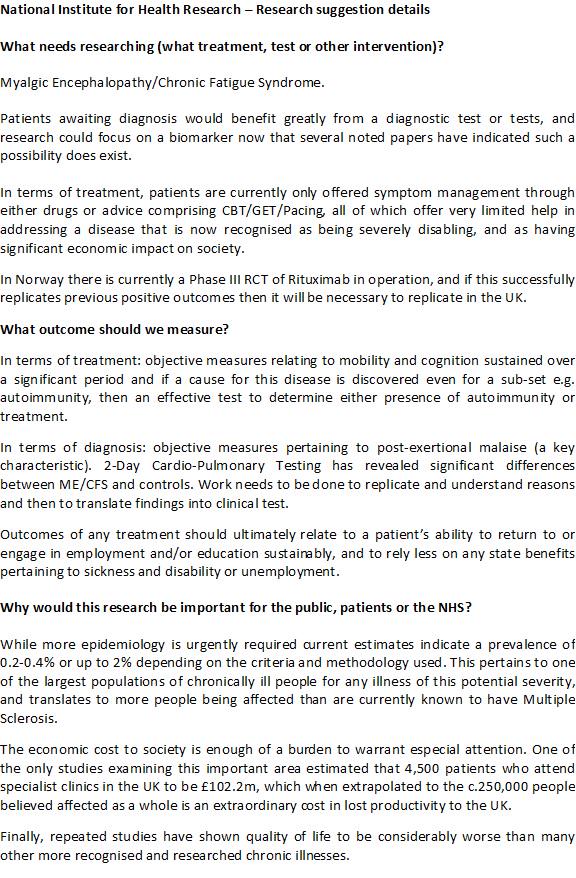 The UK’s National Institute for Health Research (NIHR) is asking for suggestions from patients, carers and members of the public for tests and treatments that need to be researched.
The UK’s National Institute for Health Research (NIHR) is asking for suggestions from patients, carers and members of the public for tests and treatments that need to be researched.
M.E. patients in the UK are all too aware of the ways the NHS falls short in its tests, treatment and care for people with our illness, and it often feels as if no one cares or listens to what we need.
We’re being asked for our suggestions for research to be funded by NIHR for the NHS. Let’s step up and make our ideas for research into new tests and treatments heard.
Tips and ideas:
- If you don’t have a suggestion at the moment you can still submit it at a later date as this is ongoing
- There are only three questions about your suggestion and your answers don’t have to be long.
- Read the information on NIHR’s Help us shape research page so that your suggestion has a good chance of being used, including example answers when you click on the questions at the bottom.
- You could write in Word to start with, as tipsforme suggests in the first comment below, so you can pace yourself without losing your answers and check you’re within the character limits.
- Don’t worry about adding references, or it being a perfect piece of writing.
- You could also paste your submission in the comments section below to give other people some ideas or Tweet about it using #ShapeResearch .
- If you have any questions, you could try asking @OfficialNIHR on Twitter .
- Here’s the form to fill in on the NIHR website .
- You can also apply to be a public reviewer of the research suggestions submitted to the NIHR.
Comments are welcome in the section below.
Right, I’ve submitted one. BTW I recommend drafting in Word as there’s a pesky character count. I’ve tried to put it in research speak, but I imagine it’s fine to be a lot more informal than my version. This is what I submitted:
What needs researching? 1000 characters
There is an under diagnosed overlap between ME/CFS and Postural Tachycardia Syndrome (up to 30% of ME/CFS also have POTS and 40% POTS also meet CFS criteria). This subgroup has differentiating phenotypic features.
Some experts in ME/CFS find that avoiding high heartrate during activities of daily living helps to avoid post-exertional malaise (a central symptom). Is this relevant to the tachycardia aspect of POTS? Patients with POTS are often prescribed beta blockers to reduce heartrate. Research into the specific ME-with-POTS subgroup comparing different methods of managing heartrate could lead to better treatment.
Reference: Hoad et al (2008) Postural orthostatic tachycardia syndrome is an under-recognized condition in chronic fatigue syndrome, Q J Med; 101:961–965 doi:10.1093/qjmed/hcn123
Lewis I, Pairman J, Spickett G, Newton JL (2013) Clinical characteristics of a novel subgroup of chronic fatigue syndrome patients with postural orthostatic tachycardia syndrome.J Intern Med;273:501–510
What outcomes measured? 800 characters
Experimental variables could include taking a drug to reduce heart rate (beta blockers) compared with a non-heartrate based drug for POTS (eg vasoconstrictors, midodrine or increasing blood volume). It would also be useful to include a comparison of lifestyle management one based on heart rate (heartrate monitor alarms to avoid anaerobic threshold) one not (Pacing based on symptoms).
Measurable outcomes could include established, subjective symptom scales, orthostatic function analysis, pedometer style measures of activity, levels of return to work or previous activity.
Why important? 800
ME/CFS has a devastating effect on quality of life, up to 25% are effectively house or bed-bound. Around half of the POTS subgroup claim disability benefits.
Recognition of this POTS subgroup is recent, and therefore under researched. The phenotypic difference includes higher autonomic dysfunction. Since dysautonomia and orthostatic intolerance are better understood than most aspects of ME/CFS it seems hopeful that symptoms could be better managed for this subgroup.
McDonald C, Koshi S, Busner L, et al (2014) Postural tachycardia syndrome is associated with significant symptoms and functional impairment predominantly affecting young women: a UK perspective. BMJ Open 2014;4:e004127. doi:10.1136/bmjopen-2013- 004127
LikeLiked by 1 person
That’s great and like you say, I don’t think they’re expecting suggestions to be like a scientific paper but well done for providing references anyway, it does add evidence to back up your suggestion. Very well done! 🙂
LikeLiked by 1 person
Yes, I was searching around for a reference for the high heartrate avoidance thing and my partner (a researcher!) pointed out that it was ridiculous enough that we patients have to suggest studies without worrying if it’s fully referenced! I’m naturally interested in research so quite enjoy it. I like the Mendus studies for that reason.
LikeLiked by 1 person
Yes, exactly but really well written. Thanks for posting it here as well. I’ve just tweeted about your submission so hopefully it will also inspire others to submit their suggestions too 🙂
LikeLiked by 1 person
@Firestormmer has submitted his suggestion to NIHR:

LikeLiked by 1 person